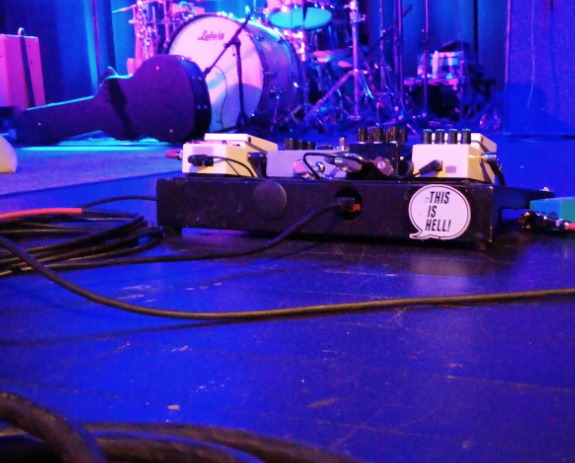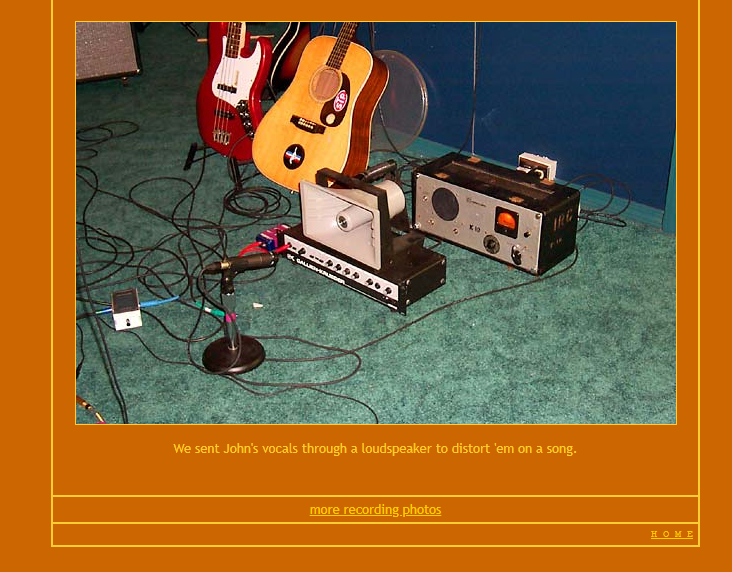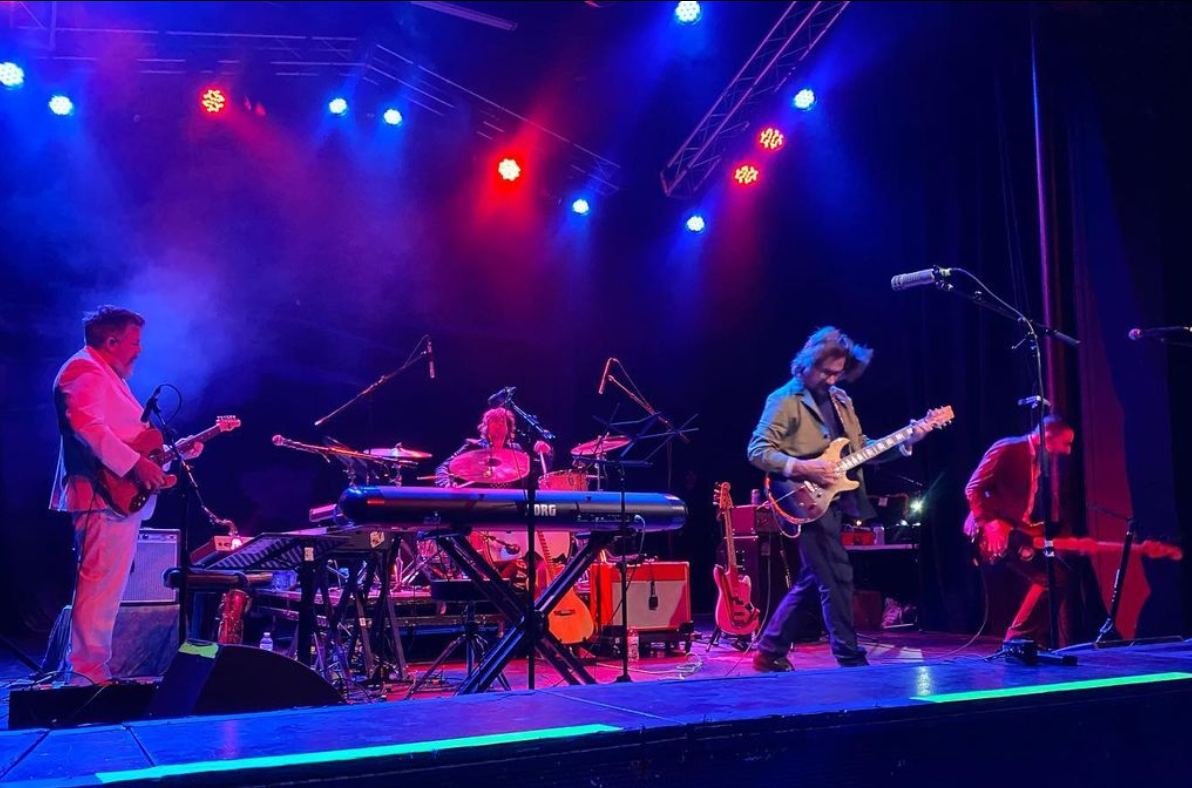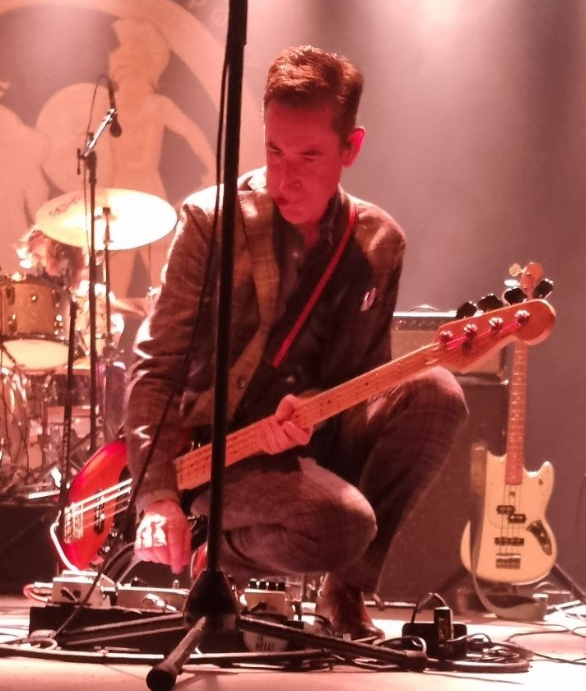
Photo by the author, July 27th 2024
Exit Blues
After one last hot August night with the Mountain Goats, it's time to say goodbye to that guy in the suit.
August 25th, 2024
by Claremont Cometh Admin
If the Mountain Goats show has doors at 7 p.m., you will almost certainly find the faithful already waiting outside at 2. They sit on sidewalks in rain, snow, tornado sirens, and heat index warnings. Some want the dead-center real estate in front of John Darnielle. The devoted Matt Massive stake out a spot to watch multi-instrumentalist Matt Douglas move between saxophone, mellotron, keys, and guitar. Jon Wurster, hidden behind a drumkit and an odd angle behind amps and his bandmates, still gets watchful eyes up front angling around the cymbals, waiting to see him lift the vibraslap. Others double-time out of the venue security checkpoint and, every night, made a beeline for stage left, wanting a spot by Peter Hughes' pedalboard, with its speech bubble sticker proclaiming: THIS IS HELL!
For nine years, at nearly seventy Mountain Goats shows, with various assemblies of friends and strangers. I've been a dutiful sidewalk-camper, and I've run to that pedalboard. And for years, people have heard me tell them while we stand there before the opener, after the opener when the gear is being moved, during the lull after all the levels are set: "this is the best part." Not mid-set, not stumbling out aglow after encore, but here. Stopping to recognize the moment of potentiality, before the thing has even become yet. "This is the best part." Always in the same spot, seeing the same gear, all part of the ritual of going to shows. Knowing the good thing is just around the corner, even if you don't know exactly what to expect just yet. "This is the best part," a friend will sometimes repeat back to me. Everyone has their routines, their positions, their landmarks. A bass with a WFMU sticker, patiently waiting on its stand, has been mine for almost a decade.
It's the end of an era.

Photo by the author, July 27th 2024
Peter Hughes and John Darnielle, united by the Inland Empire DIY scene in 1992, were rarely out of each other's orbit in the early years of the Mountain Goats. They contributed backing vocals to each other's work: Peter added harmonies to "Cubs in Five" on Nine Black Poppies in 1995; and when Peter's 90's band Diskothi-Q covered The Cars' "Just What I Needed" for 1996 Cactus Gum compilation Whiskey, You're The Devil, John and producer Bob Durkee yelled along in the chorus. Both collaborated with the broader Shrimper Records scene's prolific talents: Wckr Spgt, Franklin Bruno, Refrigerator. They appeared on the same compilations, they kept up with each other's work.
When the Mountain Goats went to Europe, Peter signed on to play bass for two tours in 1996. The first reportedly went fine, and the second was legendarily bad. But after a few years of running as a solo act, recording steadfastly into a boombox with all its whirring droning tone for company, change came for the Mountain Goats. When the CD player set 2002's Tallahassee spinning to life, it made this known: the first notes of the album are the studio-recorded tones of Peter Hughes' bass.

Photo by Peter Hughes, content screencap from fivetools.com, from the Tallahassee recording sessions
Peter once maintained photo diaries on his personal website, FiveTools, and included photos he took of the Tallahassee recording sessions. A photographer since his high school years, Peter captured the highlights of the recording for posterity. He would go on to document tour crowds, local sights, and more recording sessions on FiveTools, all the way through 2010's recording of All Eternals Deck and ensuing spring tour. By that point, the band had added Jon Wurster on drums full-time (first on tour, then on every studio record from 2008's Heretic Pride onward), creating a rhythm unit that functioned on near-telepathy by the end of its run.

Photo from fivetools.com, AED recording session
And then, in 2015, the band added multi-instrumentalist Matt Douglas to the touring lineup. Matt had played on Beat the Champ, but made the rare leap to full-time band member. This began the band's nine-year run as a consistent four-piece outfit, and what an outfit.
The work produced by the Darnielle-Hughes-Wurster-Douglas lineup from 2015 to 2024—Beat the Champ, Goths, In League With Dragons, Getting Into Knives, Dark In Here, Bleed Out, and Jenny From Thebes—and the odds & ends (Marsh Witch Visions, Hex of Infinite Binding, The Jordan Lake Sessions) not to mention countless live show bootlegs that flooded the Internet Archive from tapers of all skill levels, capture a band finding incredible new reach and grasp at every turn.

Photo by Emerald Green
From its inception, the Mountain Goats had an engine meant for racing, a truly unknowable redline, waiting for the right machine. Adding Peter, adding Jon, it ran smoother and more beautifully with every passing mile, finding its grip on better tires, cornering neater. With Matt on board, they could take those corners flat-out. The band could improvise, could trade off guitar and piano duties, could bounce off each other and wander and feel things out until they built to a pulse. "Whole Wide World" began as a beautiful 2:13 acoustic solo piece on 1995 record Sweden. At the Mountain Goats' first show back since the COVID-19 quarantine, they transformed "Whole Wide World" into a slow-built, soaring four-piece arrangement clocking in at a full five minutes. I was there; I was crying. We had all been apart for so long.
You always have to be ready for things to change.

Photo by Adam Butler. Union Transfer, August 3rd 2024.
Midway through an east coast run of shows in early August 2024, Peter Hughes posted a positive COVID test to Instagram. He sat out the final four shows of the tour. In his absence, the band and crew rallied. Matt Douglas picked up bass parts with one hand on the keyboard and melody on the other. Jon Wurster got on backing vocals. Touring member Isa Burke and recent crew addition Ben Loughran took on temporary bass duties. Even longtime front-of-house manager Brandon Eggleston picked up Peter's bass. Two of these shows are immortalized on the Internet Archive in all their moment-to-moment invention, proof of a band made more agile from years of hard work, bound by enough trust to actually go for it.
And while the Mountain Goats tried to manage a temporary setback, wheels began to turn elsewhere. They had taken an accidental step into the future.
On a quiet Monday afternoon, after a week of unseen conversations, Peter Hughes took to Instagram again to deliver a fond farewell: after two decades as a Mountain Goat, he's decided to step back. Not gradually, not "soon" or "after the next record" or anything like that. Effective immediately; in totality; yesterday. He's out.
You won't find any drama here. Peter has always loved tour, and the band. But when you have to let something go, you have to let it go. Exhaustion, illness, the wisdom of age; whatever taxonomy it sorts under, it's enough. The band and crew are in his corner. It's hard to imagine a better cheerleader than Jon Wurster, who quit Superchunk in 2023 after 31 years. Sending him off with well-wishes, the remaining three core members will undergo some yet-unseen alchemical process in the next year, feeling out the new geometries. The planned fall John-and-Peter duo tour will run now as a John-Jon-Matt trio tour, foregrounding his absence. The next album's recording sessions will be the first in over 20 years without Peter in the room. That's for them to figure out, and it's out of anyone else's hands.
But what about you? You, constant show-goers, sidewalk-campers, faithful companions?
When everyone runs to the stage this October on the trio tour, Peter's pedalboard will be gone. He's supposed to be there at stage left, your right, where the stage diagram has steadfastly placed him all these years. He's supposed to walk out, tall and lanky in his nice suit, with his hair neatly combed, in his dress shoes that reflect the stage light. He's supposed to pick up one of those basses—the classic with the WFMU sticker, the newer Fender Mustang with its provocative single eye emoji—and groove. Isn't he? Haven't you come to feel so familiar with it all? This is for you, people of the pedalboard. This is for everyone who knows the man in the suit.
You will never see that man again.
This is the truth: Peter Hughes is a writer and photographer from Chino, California. A lifelong car enthusiast, Peter has written for Road & Track and Jalopnik, and wrote extensively for Autoweek, from 2012 to the print magazine's sudden 2019 demise at the hands of the Hearst Corporation. Peter lives in Rochester, a city he loves, with his wife and daughter. He has a show on Rochester's WAYO 104.3 FM, on Thursday mornings at 10, called Northern Gothic. Peter's Instagram, which some people may have seen for the first time during his announcement, is mostly an archive of car photos. Peter has also played in various bands since the mid-1980's, playing on a number of studio albums and performing as a touring musician.
I would know a thing or two about those various bands. The very website hosting this essay, Claremont Cometh, is named for a song from an early tape of his solo project, Party of One. It began as an archive for Diskothi-Q, for Party of One, for Peter's old label Sonic Enemy. The site is bigger than that now, and it's a point of pride for me that it's become more about music Peter liked at the time, than the work he was making himself. I've learned to let go of that first animating impulse, the stupid one, the irrational one: if I could learn as much as possible about Diskothi-Q, ask the right people, dig, dig, I could somehow make it not past. But Diskothi-Q is gone, and should be gone, to make room for all the new things that followed.
And, more importantly: no matter how much I listened to those recordings, I was only assembling an idea. I was taking art, and a public-facing persona, and third-hand stories, and wondering about The Guy From Diskothi-Q. Not Peter Hughes, exactly, but some snapshot of him long gone from the world. That's the trick: you can't stand in 2024 and have a moment of two-way human connection with someone standing in 1996. You can only commune with yourself through an idea someone else gives you. You draw a figure on paper, hoping it might resemble one they once drew. Even someone in July 2024, as each day passes, is further abstracted and lost to you. The past is past.
Peter Hughes will never be The Guy In Diskothi-Q again. Peter Hughes will never be that guy in the suit at stage left again. But right now, and for the foreseeable future, there is Peter Hughes: car enthusiast, husband and father, writer and photographer, proud Rochester resident; just some guy, with the future wide open ahead of him. This is the person who will be in the world with you. This is the person who will be cheering on the Mountain Goats in their new form, just like you. You may not even recognize him, if you see him on the street. But as he leaves an empty space behind in the Mountain Goats, and the Mountain Goats leave behind a new, open space in his life, we all get to wonder: what's next?
And here we are again. While the stage is still empty, still waiting, we wonder. What might you feel, that you didn't expect to feel? What kind of connection could you find with someone else here? What could change that you haven't even imagined yet? Waiting for the house lights to dim, for the walk-on music to flood the room. Something will happen. Everything that came before is already lived and loved and past, and here we are before the next good thing has even found us yet. Something new onstage, transforming. Something in a new arc away, transcending it. How could I be anything but excited?
This is the best part.
Other Essays: July 20th, 2025: It's All One Room